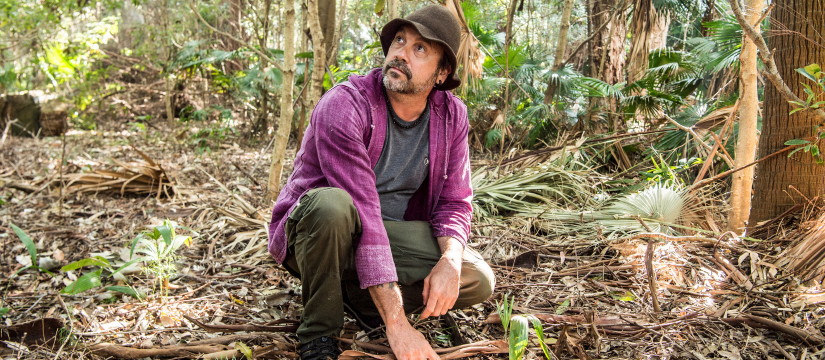
Helping to heal country – Indigenous cultural specialist Victor Steffensen
For decades, Victor Steffensen has listened to the land. He’s helped Indigenous and non-Indigenous people connect with country and healed the Australian landscape by sharing ancient traditional knowledge passed onto him by two Elders in Far North Queensland who shaped his life.
A descendant of the Tagalaka people through his mother’s connections in north Queensland, Victor is an author, filmmaker, musician and co-founder of the Firesticks Alliance and the National Indigenous Fire Workshop, which has inspired communities and strengthened culture across Australia.
As a specialist in traditional knowledge, he has spent years advocating for a return to cultural burning practices led by local First Nations people, and travels across the country giving fire workshops to farmers, firefighters and government agencies.
“I’m somebody who has taken on the aspiration of a lot of Elders in Australia and mentors in my life to help our people and also to help the country and the environment,” says Victor. “And, when I say our people, it's about helping everybody, white and black, because everyone lives in Australia now.”
Having grown up in the rainforest town of Kuranda, on the Atherton Tablelands near Cairns, Victor loved the bush and wanted to be a ranger or actor but had no clear career path.
Aged 18, on a fishing trip to the tiny town of Laura on the Cape York Peninsula, he met Kuku Thaypan Elders and brothers Dr Tommy George and Dr George Musgrave.
Bush tracker George and ecology expert Tommy became Victor’s mentors, passing on thousands of years of knowledge about medicines, plants, animals and stories of the landscape, including Indigenous fire practices.
For more than 10 years, Victor lived in Laura working with Tommy and George, creating a database of their expertise, much of it recorded on video. He began educating others, showing how to respect the ecosystem, heal the land and prevent destructive bushfires.
His workshops in Indigenous cultural burning are now in huge demand in Australia and overseas – even more so after the devastating bushfires of 2019-20.
“People and the environment go together,” he says. “So, helping people to help our environment is really the aspiration of Aboriginal people Australia-wide.
“All I want to see is the land being looked after the right way for future generations. I want to see this nation wake up to itself in a way to make that happen.”
Helping build connections with country
Like Tommy and George before him, Victor is the recipient of an honorary doctorate from James Cook University. His workshops, and his sharing of knowledge with young people, pastoralists, cultural organisations and government bodies, means he lives away from his beloved bush – on the outskirts of Cairns – to be near an airport.
“I’m hoping that one day, when I stop doing this work, I'll be able to go back out in the bush to live,” he says. “I’ll go back into my own homeland and help my own clan groups and people.”
For now, he works tirelessly advocating for cultural burning, mentoring Indigenous rangers and fire authorities and passing on Tommy and George’s legacy.
“It makes me feel amazing when I see people rebuild their connection to their landscapes,” he says. “When I see Aboriginal people just instantly change in front of me, become happy and excited and motivated to get out there and start looking after their land. The appreciation that they show, learning so much in such a short time, helps them move forward in their lives and with their country.
“It’s the same with non-Indigenous people. When I see farmers that are so grateful for the support and helping to make their land better and improve their livelihood, when I see non-Indigenous people finally get a proper lens on the landscape, the way that the old people saw the land, when you see people go through that appreciation and change, that feels really good.”
Victor believes everyone can play a role in coming together and understanding country. “Reconciliation is a good thing, but I'm hoping to see greater achievements of that word into the future than what we've already done in the past,” he says.
“When you see the land healing, and you see those fires are so beautiful and you see the country and the animals benefitting from the land, from those fires, it’s such a great feeling. That’s shared with the people from those areas. It’s just a really beautiful thing.”


